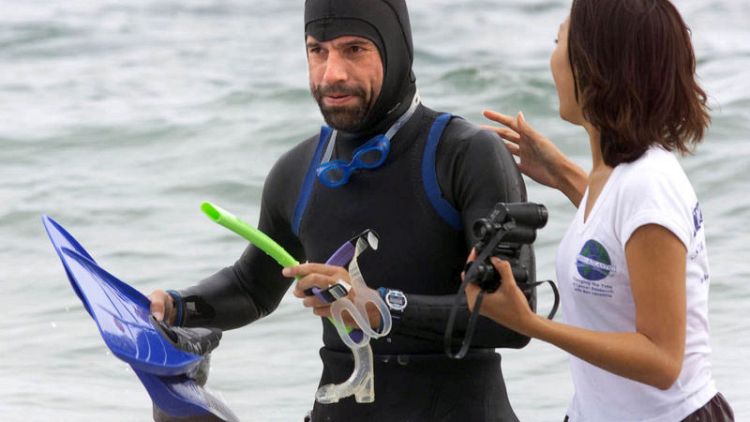By Jack Tarrant
TOKYO (Reuters) - Ben Lecomte has been forced to abandon his ambitious attempt to swim across the Pacific Ocean after his accompanying boat was damaged in a storm, but the Frenchman will continue in his quest to raise awareness concerning marine pollution.
The 51-year-old had completed more than 2,700 kilometres of his bid to become the first swimmer to traverse the world's largest ocean before he called off the endeavour when the mainsail of his support vessel was irreparably damaged.
Lecomte set off from Japan's east coast on June 5 and was aiming to swim 9,100 km to San Francisco but admitted defeat after falling foul of a setback he said was out of his control.
"I am very disappointed because I had not reached my mental and physical limits," Lecomte told Reuters in an email.
"But there is nothing we can do about the weather and sea conditions, this is out of my control so I just have to accept it and be thankful that everybody is safe.
"The strong winds damaged our mainsail, and even after repairing it, our fix did not hold," added Lecomte, who previously swam the Atlantic Ocean in 1998.
"If that happens, we can only rely on our engine, but we would not have enough fuel to get to land."
Despite the disappointing end to his swim, Lecomte insists his primary mission will continue with the Frenchman determined to raise awareness of the plastic pollution in the world's oceans, something he has witnessed first hand.
"The swim was important to me but what is even more important is our mission of contributing to a better understanding of our ocean's health and raising awareness of plastic pollution," Lecomte added.
"I am fully committed to that."
Lecomte had just reached the Great Pacific garbage patch, a huge gyre of marine debris floating in the ocean between Hawaii and California, when the sail broke on his support boat.
"I never expected to see that much plastic," Lecomte admitted.
"On average, during our debris watch, we would see one piece of plastic debris every three minutes and we collect three pieces of micro plastic every minute when we tow our net."
Much of the research conducted by Lecomte's team focused on the build up of 'plastic smog' caused by billions of pieces of microplastic and there is increasing concern among scientists about the effect of pervasive pollution on marine ecosystems.
"That is still possible so in that sense our mission isn't over," Lecomte said.
"In the end, what is important is not swimming across an ocean but rather raising awareness about plastic pollution and inspiring people to make some changes... and I think swimming in the garbage patch will do just that.
"I remain hopeful that we can still get there in the coming days before being forced to head to land."
Much of his backing comes from scientific publisher Seeker.com https://www.seeker.com/theswim, who will continue to provide updates on Lecomte's findings.
(Reporting by Jack Tarrant; Editing by John O'Brien)


